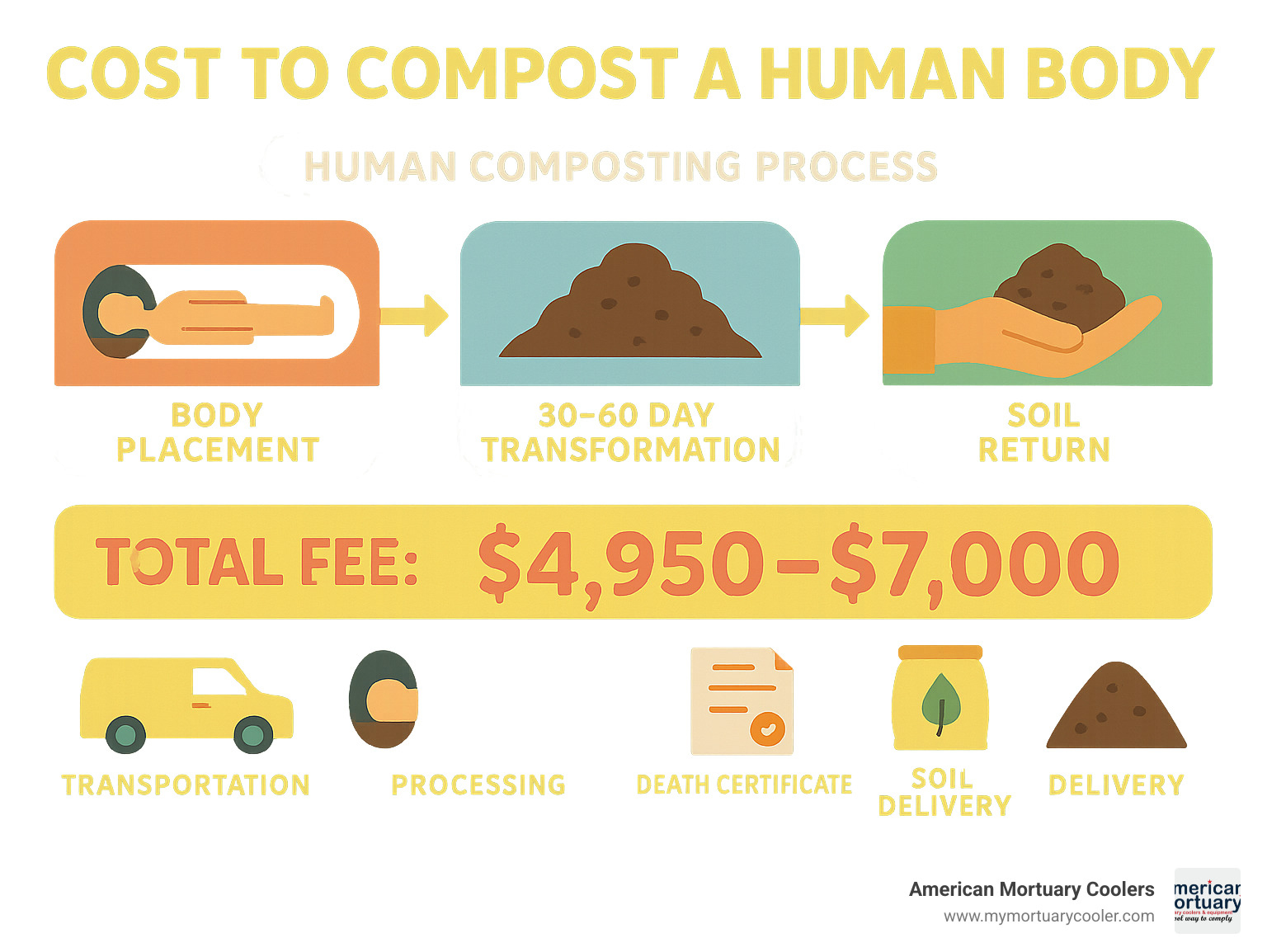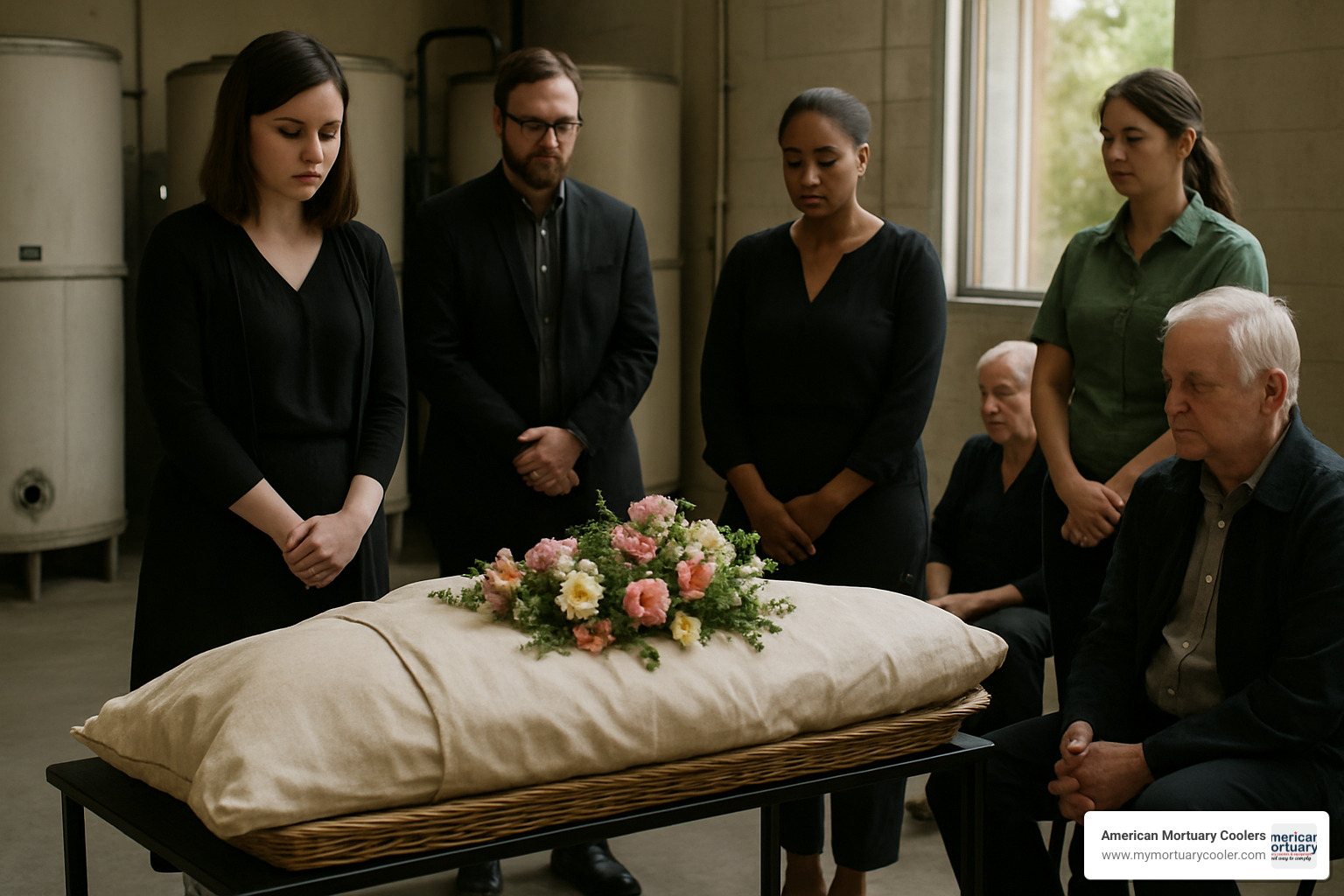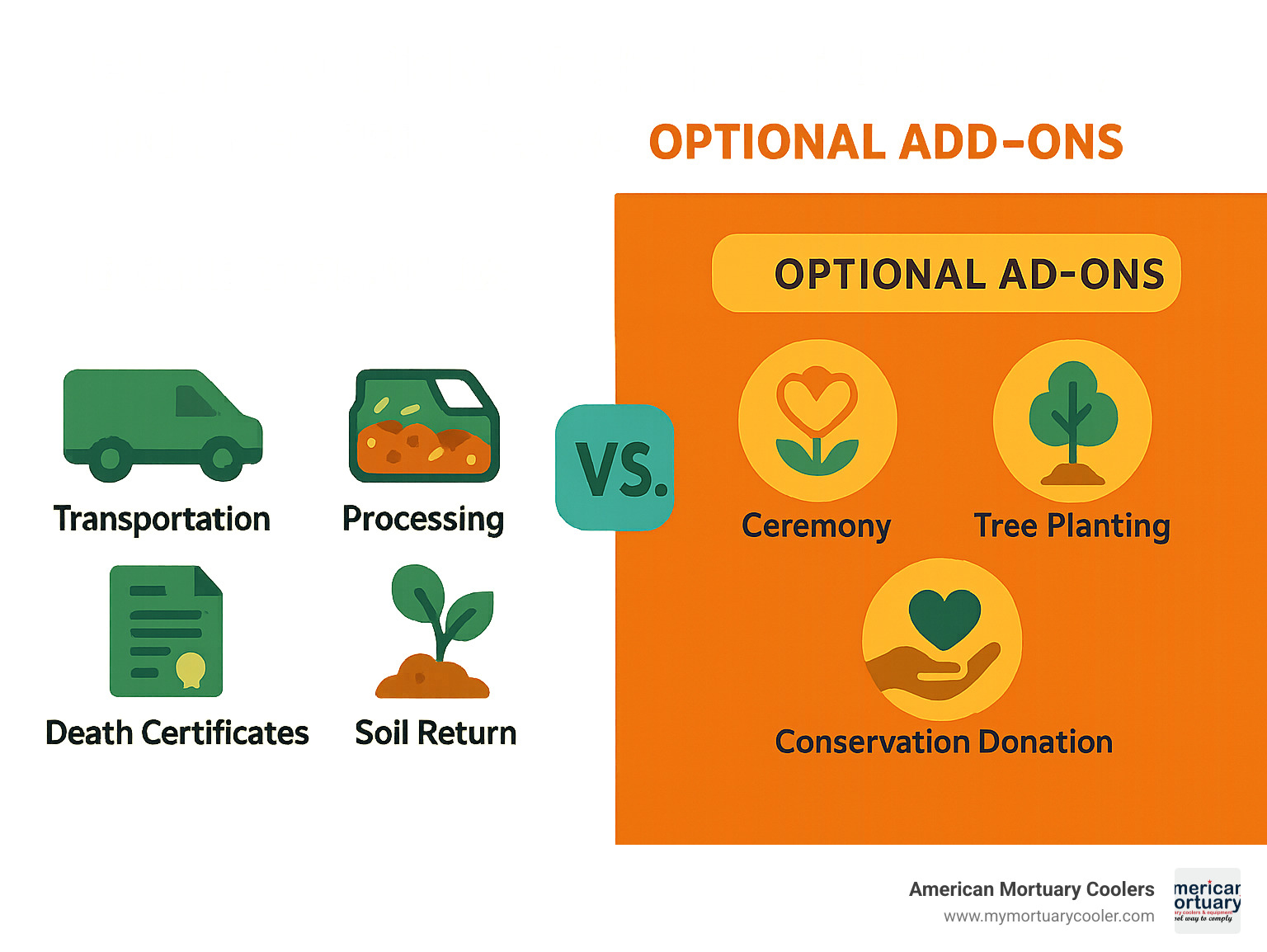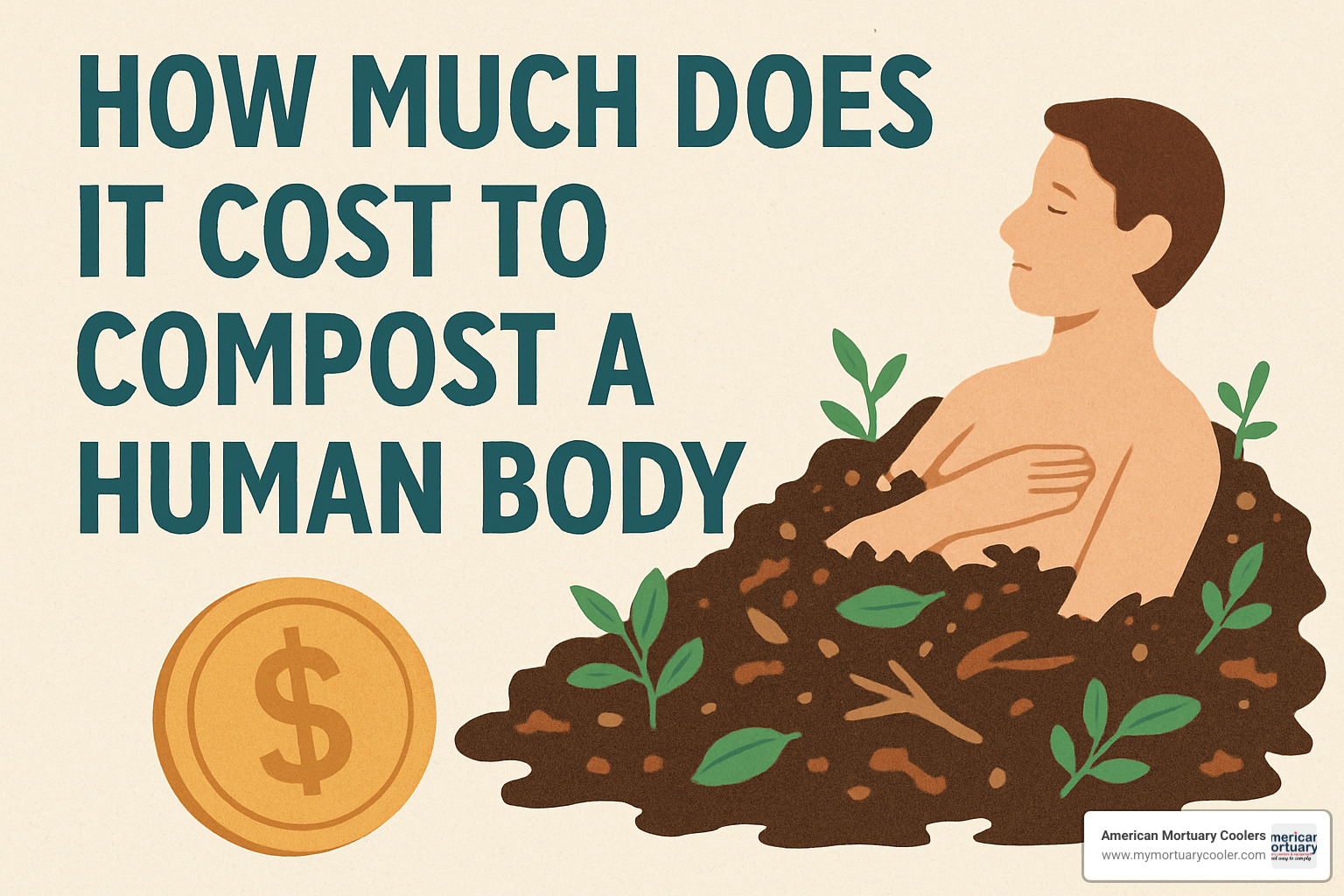Why Human Composting Costs Matter for Modern Funeral Directors
How much does it cost to compost a human body ranges from $4,000 to $7,000, making it competitive with traditional burial and cremation services. Here's what you need to know:
Quick Cost Comparison:
- Human Composting: $4,950 - $7,000
- Traditional Burial: $7,848 (average, excluding plot)
- Cremation with Services: $6,971 (average)
Major Providers & Pricing:
- Recompose: $7,000 (all-inclusive)
- Return Home: $4,950 (terramation service)
- Earth Funeral: $5,000 - $6,000
As funeral directors face growing demand for eco-friendly alternatives, human composting—also called natural organic reduction or terramation—has emerged as a legally recognized option in 12 states. This process transforms human remains into nutrient-rich soil over 30-60 days, offering families a meaningful way to give back to the earth.
The cost structure differs significantly from traditional services, with most providers offering all-inclusive packages covering transportation, processing, death certificates, and soil return. However, additional fees for out-of-state transport can add $3,000 or more to the base price.
I'm Mortuary Cooler, a national-level mortuary equipment supplier who has worked extensively with funeral homes adapting to new disposition methods, including facilities offering human composting services. My experience helping funeral directors understand how much does it cost to compost a human body has shown me the importance of transparent pricing in this emerging market.

Easy how much does it cost to compost a human body word list:
How Much Does It Cost to Compost a Human Body?
When families come to us asking "how much does it cost to compost a human body," we always start with the basics: you're looking at somewhere between $4,000 and $7,000 for the complete service. That puts human composting right in the sweet spot compared to traditional options.
Here's what might surprise you: traditional burial averages $7,848 (and that's before you buy the cemetery plot), while cremation with services runs about $6,971. When you add in cemetery costs that can hit $5,000 to $10,000, human composting starts looking pretty attractive from a budget standpoint.
The three main players in this space have carved out different price points. Recompose charges $7,000 for their all-inclusive package, Return Home comes in at $4,950 for their terramation service, and Earth Funeral sits in the middle at $5,000 to $6,000. Each one covers the essentials, but the details vary quite a bit.
National Price Range for "how much does it cost to compost a human body"
The sweet spot for most families ends up being around $5,500 when you look at median figures across all providers. That's your typical all-inclusive deal that handles everything from pickup to paperwork to getting your soil back.
Premium providers like Recompose tend to charge between $6,500 and $7,000. They're the pioneers who got this whole industry started, so you're paying for that expertise and track record. Mid-range options like Earth Funeral usually fall between $5,000 and $6,000, giving you solid service without the premium price tag. Budget-friendly providers like Return Home keep things simple at $4,950 to $5,500.
What you get for that money is pretty comprehensive: body transportation within your state, all the death certificate filing, the actual 30 to 60-day composting process, soil processing and testing, and getting that finished soil back to your family.
Provider-by-Provider Breakdown
Recompose basically invented modern human composting in America, so their $7,000 price tag reflects that pioneering status. They handle everything from the moment of death through the 8 to 12-week change into soil. That includes picking up your loved one within the state, storage, filing death certificates, and soil pickup when you're ready. They started in Washington and have been the driving force behind legalizing this process across the country.
Return Home takes a different approach with their $4,950 terramation service, making them one of the most budget-friendly options out there. They've streamlined the process to keep costs down while still covering all the basics: transportation to their facility, the composting process itself, handling all the paperwork, and returning the soil to your family. What's impressive is they serve 49 states plus Canada, with a 60-day total timeline (30 days for composting, then 30 days for the soil to rest and stabilize).
Earth Funeral charges between $4,950 and $6,000 depending on which service package you choose. They're big on the environmental angle, using renewable energy and partnering with conservation groups. Some of their packages include tree planting using the compost, which is a nice touch for families who want that extra connection to nature.
For a deeper dive into what each service includes and how they compare, check out our comprehensive guide to body composting costs.
Hidden & Additional Fees for "how much does it cost to compost a human body"
Most providers advertise all-inclusive pricing, but there are definitely some extras that can catch families off guard. The biggest one is transportation costs for out-of-state services. If you're in California and want to use a facility in Seattle, you're looking at about $3,000 just for transport. That bumps your total up to nearly $8,000 to $10,000 depending on which provider you choose.
Weight limits are another potential surprise. Most facilities have a 250-pound limit, and if they do accept larger individuals, there's usually an additional fee involved. It's not something anyone wants to think about during grief, but it's worth knowing upfront.
Ceremony costs can add up too. While basic laying-in ceremonies are often included, anything elaborate—flowers, clergy, memorial services—comes with extra charges. Paperwork fees like additional certified death certificates vary by county, and shipping soil to distant family members means postal charges if you can't pick it up locally.
The key is asking your provider for a complete breakdown upfront, so there are no financial surprises during an already difficult time.
Cost Breakdown: Factors, Services & Timeline

When families ask "how much does it cost to compost a human body," the answer depends on several key factors that can make the difference between a $4,950 service and a $10,000+ total bill. Understanding these variables helps you plan and budget appropriately.
The process itself is remarkably consistent across providers. Over 30 to 60 days, the human body transforms into approximately one cubic yard of nutrient-rich soil through natural organic reduction. What varies dramatically is everything surrounding that process—from where you live to which services you choose.
Location creates the biggest pricing differences. Facilities in established markets like Washington and Colorado have competitive pricing due to multiple providers. Newer markets in states like California or New York may charge premium rates as they're still building their customer base.
The legal status in your state affects costs significantly. If human composting isn't legal where you live, you'll face substantial transportation fees to reach a facility in a legal state. This single factor can double your total expenses.
Transportation distance remains the wild card in pricing. A local family in Seattle might pay exactly $7,000 for Recompose's services, while a family in Florida could pay $10,000 or more once transport costs are added. Some providers offer self-transport options where funeral homes can arrange delivery to reduce these fees.
For detailed information about the entire process from start to finish, our guide on how body composting works walks through each step and timeline.
What Drives the Price Up or Down
Distance and shipping costs create the most dramatic price variations. Local clients in legal states pay only the base service fee, while out-of-state families often see their costs double. Some providers charge flat transport rates, while others price by mile—making location calculations crucial for budgeting.
Weight limits affect pricing and availability. Most facilities set a 250-pound limit due to vessel capacity and processing time requirements. Bodies exceeding this weight may face surcharges at facilities that accept them, or families may need to find specialized providers.
Urban versus rural facility locations impact operational costs. Urban facilities typically charge more due to higher real estate costs, labor expenses, and regulatory compliance requirements. Rural facilities may offer lower base prices but could have limited transportation options.
Community subsidies and financial assistance can significantly reduce costs for qualifying families. Recompose offers subsidized rates through their Community Fund program, while some facilities provide payment plans or sliding scale pricing based on income.
Service tier selection allows families to control costs by choosing basic packages versus premium options. Basic packages cover essential services, while premium tiers add memorial ceremonies, soil delivery, tree planting, or conservation donations.
What's Included in a Full-Service Package
Most human composting providers structure their pricing around comprehensive packages that eliminate surprise fees. Understanding what's included helps families compare true costs between providers.
Body pickup and transportation covers professional transport from the place of death to the composting facility. This includes all necessary permits, documentation, and proper vehicle requirements for dignified transport within the state.
Death certificate filing handles completion and submission of all required paperwork. Providers work directly with medical examiners and government offices to ensure proper documentation without families navigating bureaucratic processes.
Vessel composting encompasses the entire 30-60 day natural organic reduction process. This includes specialized composting vessels, temperature monitoring, oxygen regulation, and the addition of organic materials like wood chips and straw.
Soil processing and testing ensures the finished product meets safety standards. Staff remove any medical implants, grind remaining bone fragments, and conduct laboratory testing to verify the soil's safety and nutrient content.
Soil return options provide flexibility for families. Most can pick up soil directly from the facility, arrange local delivery, or receive portions shipped via mail in biodegradable containers. Some providers offer tree planting programs using the composted soil on family property or through conservation partnerships.

Legal, Environmental & Ethical Considerations

When families ask "how much does it cost to compost a human body," they're often surprised to learn that legal status plays a huge role in pricing. Right now, human composting is legal in 12 states: Washington, Colorado, Oregon, California, Vermont, New York, Nevada, Arizona, Maryland, Delaware, Minnesota, and Maine.
Washington broke new ground in 2019 as the first state to legalize the process. Since then, other states have followed as more families seek eco-friendly alternatives to traditional burial and cremation.
The environmental benefits are pretty impressive. Human composting saves approximately one metric ton of CO2 emissions per body compared to cremation. That's like keeping a car off the road for several months. The process also uses one-eighth the energy of flame cremation, making it a genuinely green option.
But it's not just about the environment. Some families face ethical and religious considerations when choosing human composting. The Catholic Church has raised concerns about human dignity, while some cultures find the process unfamiliar. We always recommend families discuss these concerns with their religious leaders and loved ones before making a decision.
There are also safety protocols to consider. The process excludes certain cases, including deaths from prion diseases like Creutzfeldt-Jakob disease, Ebola, or active tuberculosis. These exclusions exist because some pathogens can survive the composting process.
For families interested in the science behind human composting, this scientific research on environmental benefits provides detailed information about the environmental impact.
Where It's Legal & How That Affects Cost
Legal status directly impacts both pricing and availability. States where human composting has been legal longest tend to have more competitive pricing because multiple providers compete for business.
Established markets like Washington, Colorado, and Oregon offer the best pricing options. These states have multiple providers, which keeps costs in that $4,950-$7,000 range we discussed earlier. Families have choices, and competition helps keep prices reasonable.
Emerging markets in states like California, New York, and Vermont may have fewer providers and less price competition. However, costs still fall within the national average since these states have strong demand for eco-friendly options.
The real cost impact comes with out-of-state transport requirements. A family in Florida choosing human composting might pay $4,950 for the service itself, but then face $3,000 or more in transportation costs to get to a legal facility. That brings the total to nearly $8,000—suddenly making local cremation look more affordable.
Some states have pending legislation that could change this landscape. When new states legalize human composting, families there typically see costs drop as local providers open facilities and eliminate transport fees.
For specific examples of how state regulations work, check out our guide to body composting laws in Oregon. It shows how state-specific requirements can affect both availability and pricing.
Comparing Environmental Footprints
The environmental comparison between human composting and traditional methods is striking. When we help funeral homes understand how much does it cost to compost a human body, we often discuss these environmental benefits alongside the financial ones.
CO2 emissions tell a powerful story. Cremation releases approximately one metric ton of CO2 per body—that's equivalent to burning 800,000 barrels of oil. Human composting is carbon-neutral and actually sequesters carbon in the resulting soil. For environmentally conscious families, this alone can justify the cost.
Land use presents another advantage. Traditional burial consumes urban land at an unsustainable rate, requiring ongoing maintenance and preventing other land uses. Human composting produces nutrient-rich soil that can be used for conservation and reforestation projects, actually improving land rather than consuming it.
Energy usage shows dramatic differences too. Human composting uses one-eighth the energy of flame cremation. It also avoids the energy-intensive manufacturing and transport of burial caskets, concrete vaults, and metal hardware.
Chemical impact matters for families concerned about environmental contamination. Traditional burial involves embalming with over 800,000 gallons of toxic chemicals used annually in the U.S. Human composting uses only organic materials like wood chips, alfalfa, and straw—no harmful chemicals at all.
Water conservation provides an unexpected benefit. The resulting soil helps retain water naturally. Increasing soil organic matter by just 1% helps retain an additional 20,000 gallons of water per acre. In drought-prone areas, this can be significant.
For families wanting to dig deeper into the research, this comprehensive analysis of environmental impacts provides the latest findings on green burial alternatives.
Frequently Asked Questions About Human Composting Costs
How long does the process take and does time affect price?
The timeline for how much does it cost to compost a human body stays consistent regardless of how long the actual process takes. Most providers complete human composting in 30-60 days, though the exact timeframe varies by company.
Recompose takes the longest at 8-12 weeks total—that's 5-7 weeks in their specialized vessel plus another 3-5 weeks for the soil to cure properly. Return Home works faster, finishing everything in 60 days with 30 days of active composting followed by 30 days of soil resting.
Here's the good news: the duration doesn't change your bill. Whether your loved one's change takes 30 days or 12 weeks, you'll pay the same flat fee. Most providers build their timing into the base price, so there's no "rush fee" or "extended processing charge."
The only time you might see extra costs is if you delay picking up the finished soil beyond the standard timeframe. Some facilities charge storage fees after 90 days, but this varies by provider.
Is financial assistance available for families who can't afford the fee?
Yes, several options exist to help families manage the cost of human composting. The industry recognizes that not everyone can afford the $4,950-$7,000 upfront, especially during an already difficult time.
Recompose Community Fund offers the most established assistance program. They provide subsidized rates for qualifying families who can't afford their full $7,000 fee. The application process is straightforward and designed to help families access this eco-friendly option regardless of financial circumstances.
Payment plans are becoming more common across providers. Return Home and several other companies offer installment options, particularly helpful for families pre-planning their arrangements. This lets you spread the cost over months or even years.
Insurance coverage can be tricky but often works. While most life insurance policies don't specifically mention human composting, they typically provide death benefits that can be used for any legal disposition method. Check with your insurance provider about coverage details.
Funeral home partnerships sometimes offer financing options too. Some funeral directors have relationships with composting providers and can help arrange payment plans or financing for families choosing this service.
What happens to the soil and are there costs to ship or donate it?
The human composting process creates about one cubic yard of rich, nutrient-dense soil—that's roughly 500-1,000 pounds of earth that can nourish new life for generations. Most families are surprised by how much soil they receive and appreciate having multiple options for what to do with it.
Family pickup is included in virtually every provider's base price. You can collect the soil yourself at no extra charge, and most facilities provide sturdy containers or bags for transport. Many families find this pickup visit meaningful—a chance to complete the circle and bring their loved one home in a new form.
Local delivery typically comes at no additional cost within a reasonable distance from the facility. The exact radius varies by provider, but most will deliver within 50-100 miles of their location without charging extra fees.
Shipping smaller portions works well for distant family members who want to participate in memorial plantings. Providers can divide the soil into smaller, manageable containers and ship them via postal service. These shipping costs run $20-50 per package depending on weight and destination—much less than you might expect.
Conservation donation has become incredibly popular with families who want to maximize their environmental impact. Most providers partner with conservation organizations for reforestation and land restoration projects. Donating excess soil to these programs costs nothing and helps restore damaged ecosystems.
Memorial plantings offer the most personal option. Families use the soil to plant memorial trees, create memorial gardens, or nourish existing landscaping. Many report finding great comfort in watching new life flourish in soil that once was their loved one—a living memorial that grows more beautiful each year.
Conclusion & Next Steps
When families ask "how much does it cost to compost a human body," we can now give them a clear answer: expect to pay between $4,950 and $7,000 for most providers. This puts human composting right in the sweet spot compared to traditional options—often less expensive than the $7,848 average burial cost and competitive with the $6,971 cremation average.
What makes this even more appealing is that families get environmental benefits along with potential cost savings. It's not often you can do right by your wallet and the planet at the same time.
The biggest cost variables come down to where you live and which provider you choose. Families in legal states like Washington or Colorado have the advantage of local providers and no transport fees. Those in other states need to factor in that extra $3,000+ for transportation, which can change the math significantly.
At American Mortuary Coolers, we've been watching this industry shift toward sustainable practices with great interest. Our custom mortuary coolers and equipment help funeral homes across Tennessee, Georgia, Illinois, and beyond adapt to what families are asking for today. The funeral industry is changing, and we're here to help funeral directors serve families who want these eco-friendly alternatives.
Planning ahead makes a real difference with human composting costs. Pre-planning lets families lock in current pricing, explore payment options, and have important conversations with loved ones when emotions aren't running high. It's also worth checking if your provider offers financial assistance programs—several do, including Recompose's Community Fund.
The legal landscape keeps expanding too. As more states legalize human composting and new providers enter the market, we expect to see more competitive pricing and better accessibility. What seemed like a niche option just a few years ago is becoming mainstream.
For families considering this path, start with research and honest family discussions. Look at total costs including any transportation needs, understand what's included in the base price, and talk through the process with family members and religious advisors if that's important to you.
Whether you're a funeral director helping families steer these newer options or a family thinking ahead, having the real numbers helps everyone make informed decisions. For more detailed information about all available options, check out our comprehensive guide to human composting alternatives.
The future of funeral services clearly includes sustainable options like human composting. Understanding the true costs and benefits helps ensure families can choose what feels right for them during what's already a difficult time.
















